Introduction
Understanding the key types of contracts is fundamental for anyone navigating legal obligations across borders. Whether you’re a business owner, freelancer, or in-house counsel, knowing how different types of contracts operate in India, the US, and the UK is crucial for risk management and compliance.
This blog offers a clear breakdown of the five essential types of contracts, comparing how they are structured under Indian, U.S., and U.K. law. It includes real-world scenarios, jurisdiction tips, downloadable templates, and actionable legal insights for freelancers, founders, and law students alike.
Valid, Void, and Voidable Contracts
One of the most important types of contracts under any legal system includes valid, void, and voidable contracts. A valid contract fulfills all essential elements like offer, acceptance, and consideration. Void contracts, by contrast, are null from inception, often due to illegality or lack of capacity. Voidable contracts are those that are initially valid but can be rescinded by one party due to issues like coercion or misrepresentation.
In India, Section 10 defines valid contracts, Section 2(g) covers void contracts, and Section 2(i) deals with voidable contracts under the Indian Contract Act, 1872.
In the United States, commercial contracts are primarily governed by the Uniform Commercial Code (UCC), while common law governs other contract types.
In the United Kingdom, contract law is primarily governed by common law principles established through case law, alongside statutes such as the Contracts (Rights of Third Parties) Act 1999 and the Misrepresentation Act 1967.
| Jurisdiction | Legal Basis |
|---|---|
| India | Section 10 of the Indian Contract Act, 1872 outlines the essentials of a valid contract. Definitions of void and voidable contracts are found in Sections 2(g) and 2(i), respectively. |
| U.S. | Governed by state-specific laws and the Restatement (Second) of Contracts, which provides general principles recognized across jurisdictions. |
| U.K. | Rooted in common law, shaped by judicial precedents and statutes such as the Contracts (Rights of Third Parties) Act, 1999. Notable case law includes Carlill v. Carbolic Smoke Ball Co. (1893) for foundational principles of offer and acceptance. |
- Void contracts are legally unenforceable from the outset due to factors such as illegality, impossibility, or absence of essential elements like consideration or capacity.
- Voidable contracts, on the other hand, are initially valid but give the aggrieved party the option to rescind due to reasons like coercion, undue influence, fraud, or misrepresentation under Section 19 of the Indian Contract Act.
- 🧠 Example: A contract signed by a supplier under threat is valid initially but becomes voidable at the discretion of the supplier. If the supplier chooses to rescind, the contract becomes unenforceable.
Express and Implied Contracts
Another crucial category in the types of contracts is express versus implied contracts. Express contracts are explicitly stated either orally or in writing. Implied contracts, on the other hand, are inferred from the conduct of parties. For instance, when a customer sits at a restaurant and orders food, it implies a contract to pay for the meal.
Legal systems in all three jurisdictions recognize these types of contracts, although the evidentiary standards may vary. Courts in the US and UK often rely on conduct and surrounding circumstances, while in India, express contracts are defined under Section 9 of the Indian Contract Act, 1872, and consideration is governed by Section 10.
- Express contracts are written or spoken agreements with clear terms
- Implied contracts are formed through behavior or circumstances
| Jurisdiction | Recognition |
|---|---|
| India | Sections 9 and 10 of the Indian Contract Act |
| U.S. | Recognized in employment, medical, and business dealings |
| U.K. | Well established in common law through custom and trade usage |
🔍 Practical Tip: Freelancers and consultants should always opt for express written contracts to ensure legal clarity and payment protection.
Bilateral and Unilateral Contracts
These types of contracts are differentiated based on obligations. In a bilateral contract, both parties exchange mutual promises. A unilateral contract involves only one party making a promise, such as a reward for lost property, which becomes binding once someone fulfills the condition.
Indian and American contract laws treat these types of contracts similarly, while UK law emphasizes acceptance through performance in unilateral contracts, where the contract becomes enforceable once the act is completed by the offeree.
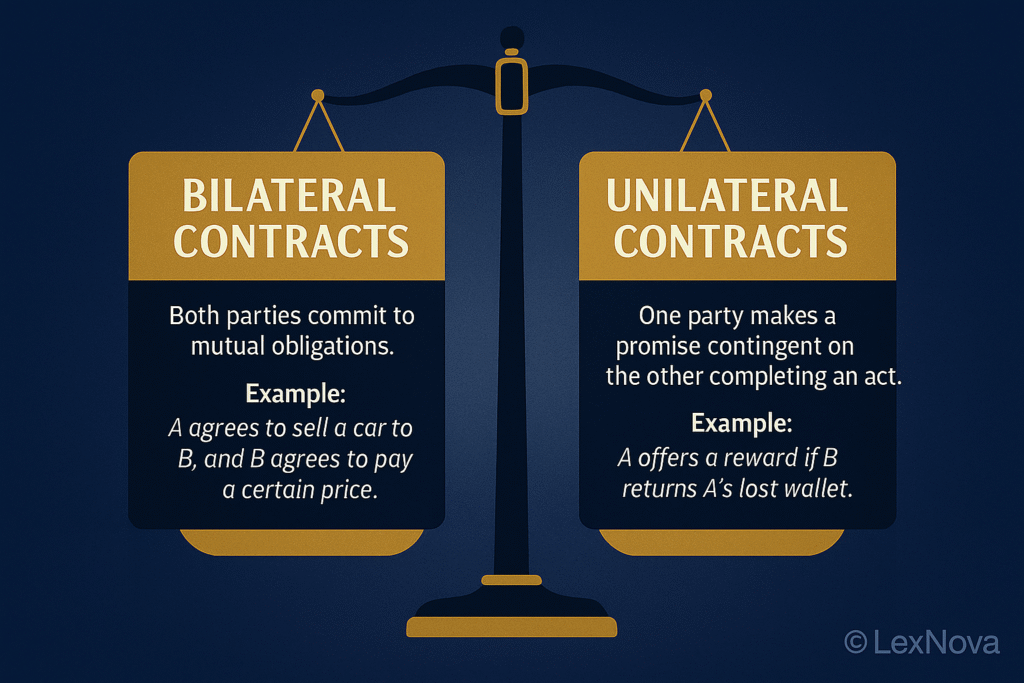
- Bilateral: Both parties make promises (e.g., service agreements)
- Unilateral: One party makes a promise, the other performs (e.g., reward announcements)
| Jurisdiction | Context |
|---|---|
| India | Functionally present, not always labeled distinctly |
| U.S. | Common in marketing, insurance, and employment cases |
| U.K. | Classic example: Carlill v. Carbolic Smoke Ball Co. |
💡 Example: A freelance platform contract where both client and provider agree to deliver and pay is bilateral.
Quasi-Contracts
Quasi-contracts are unique types of contracts that do not arise from mutual consent but are imposed by law to prevent unjust enrichment. For example, if someone receives goods by mistake and uses them, the law may enforce payment even without an agreement.
In India, quasi-contracts are governed by Sections 68 to 72 of the Indian Contract Act, encompassing scenarios such as benefit from non-gratuitous acts, supply of necessities, payment by mistake, and obligation to restore benefits. In the US, Restitution Law and quantum meruit principles apply, while UK courts consider equitable doctrines to enforce these types of contracts.
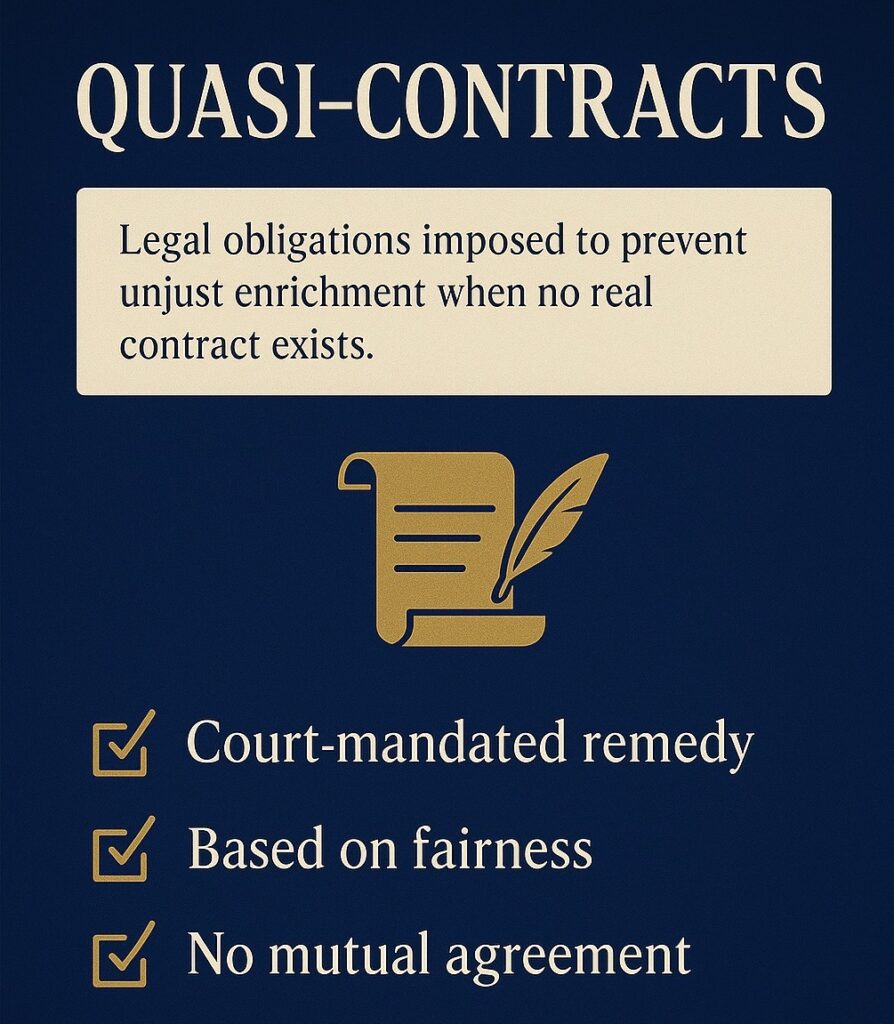
Quasi-contracts are legal obligations imposed to prevent unjust enrichment, even when no formal agreement exists.
| Jurisdiction | Legal Recognition |
|---|---|
| India | Sections 68 to 72 of the Indian Contract Act |
| U.S. | Known as constructive contracts |
| U.K. | Handled under the law of restitution and equity |
✅ Use Case: A mistaken online payment that benefits another person can be claimed back under quasi-contractual principles.
Executed and Executory Contracts
These types of contracts differ based on performance status. Executed contracts are fully performed by both parties, whereas executory contracts have ongoing or pending obligations.
In cross-border dealings, understanding these types of contracts helps in managing timelines, penalties, and dispute resolution.
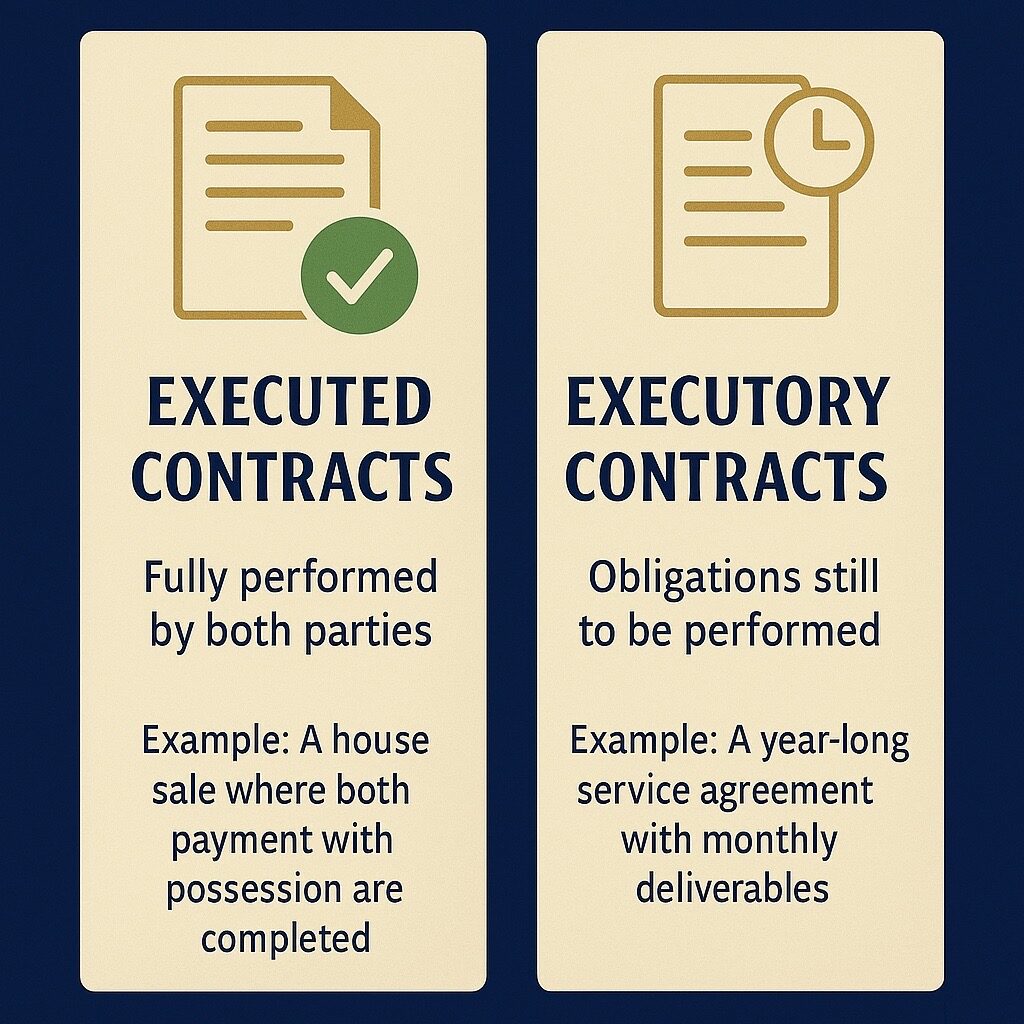
- Executed contracts have been fully performed
- Executory contracts are still pending performance from one or both sides
| Jurisdiction | Usage |
|---|---|
| India | Common in contract enforcement though not formally categorized |
| U.S. | Used in compliance tracking and transaction lifecycle |
| U.K. | Identified in commercial and legal process documentation |
🧾 Example: A service agreement where work has been delivered but payment is pending is executory.
Real-World Applications
Here are practical scenarios where different types of contracts are used:
- Freelancers in India often rely on express and executed contracts for payment clarity.
- UK employment contracts typically fall under bilateral and executed types.
- US tech startups use SaaS contracts, which are typically express and executory, with terms clearly stated and ongoing performance obligations.
Recognizing which types of contracts apply to a given context can help businesses mitigate legal risks.
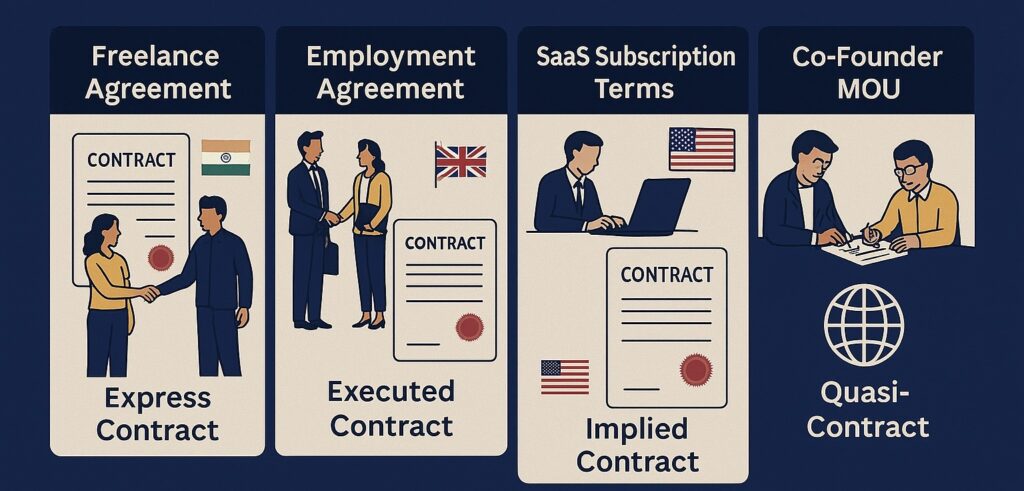
Understanding Jurisdiction Clauses
A jurisdiction clause specifies which country’s or state’s laws will govern the contract. Choosing the correct clause can save both time and legal costs.
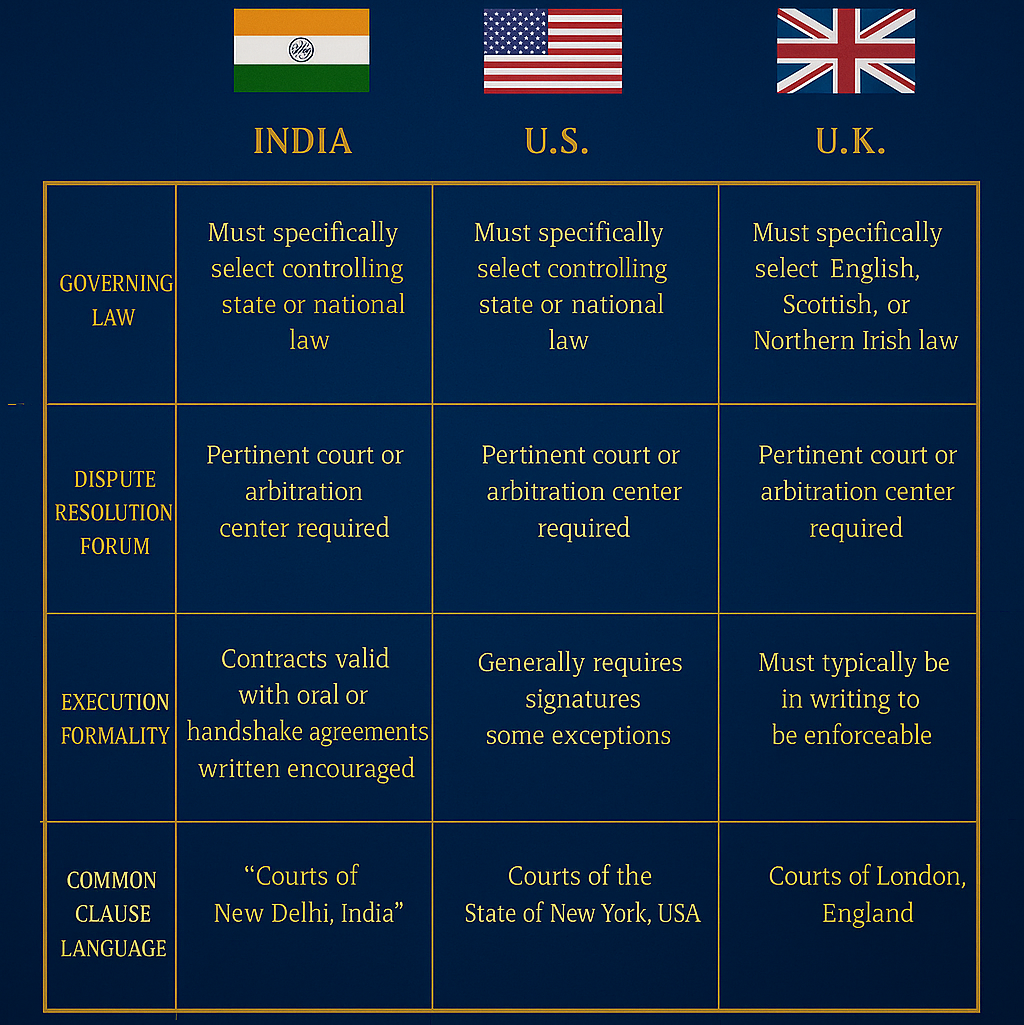
| Example |
|---|
| India: “Subject to the exclusive jurisdiction of courts in Bengaluru.” |
| U.S.: “This agreement shall be governed by the laws of the State of New York.” |
| U.K.: “Disputes shall be subject to the exclusive jurisdiction of the courts of England and Wales.” |
🚫 Frequent Mistake: Indian service providers accepting U.S. jurisdiction without understanding its implications can face costly enforcement issues.
Essential Clauses Every Contract Needs
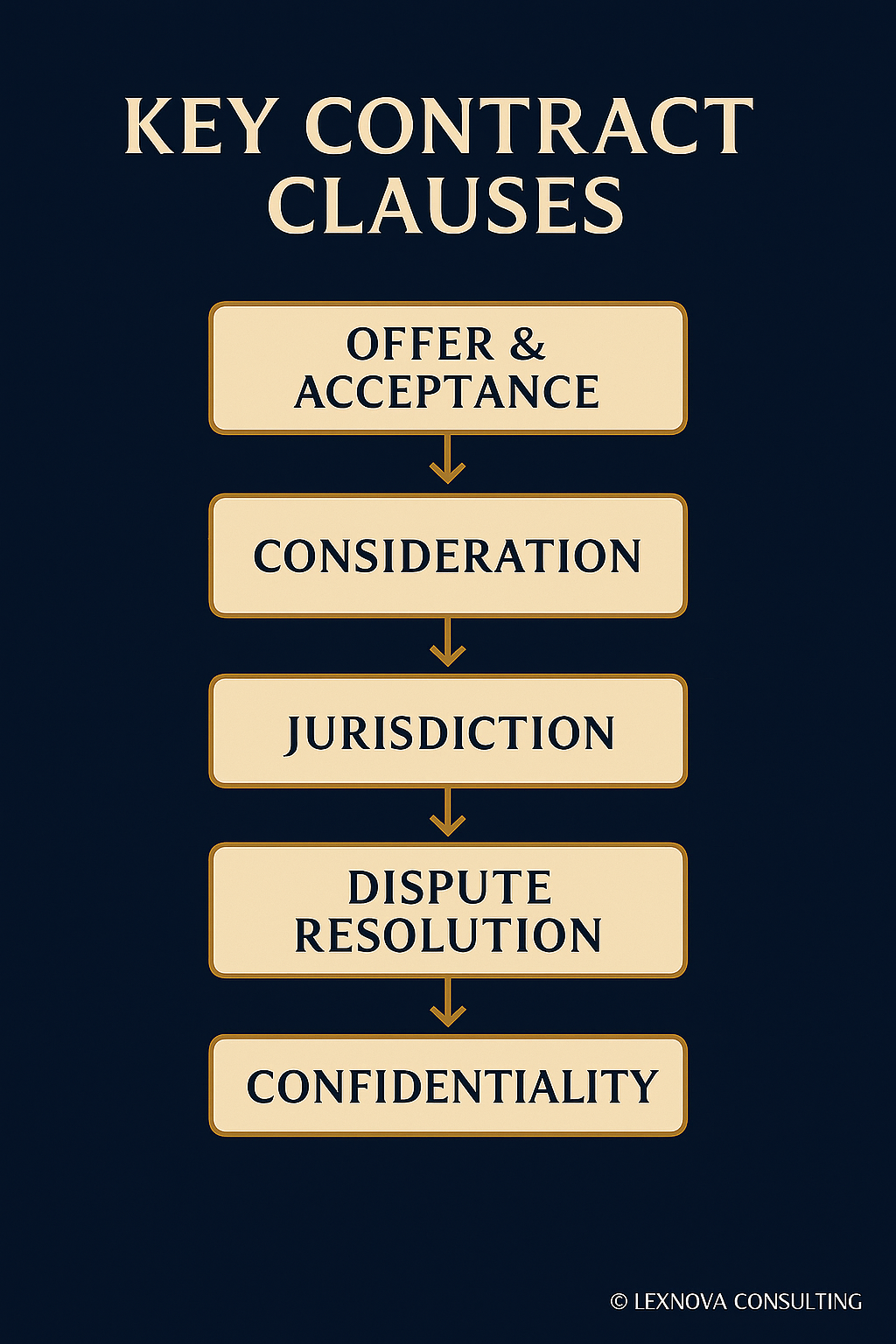
| Clause Type | Sample Language |
|---|---|
| Offer | “Party A agrees to develop a mobile app for Party B.” |
| Consideration | “Party B agrees to pay INR 1,00,000 upon final delivery.” |
| Confidentiality | “Neither party shall disclose proprietary information.” |
| Force Majeure | “Delays due to natural calamities shall not constitute breach of contract.” |
FAQ – Types of Contracts
Are WhatsApp contracts valid?
Yes, if they include essential elements like offer, acceptance, and consideration.
What is the safest contract type for freelancers?
Express, bilateral, executory contracts.
Is oral agreement enforceable?
In many cases, yes, but it is harder to prove.
Can I include Indian law in an international contract?
Yes, but make sure the other party agrees and it can be enforced.
📞 Need a Custom Contract Reviewed or Drafted?
LexNova provides reliable and jurisdiction-specific contract support tailored to founders, freelancers, and legal professionals.
👉 Contact Us for Contract Drafting & Review
📚 References
- Indian Contract Act, 1872 – IndiaCode Portal
- The Law Society – Standard Conditions of Contract (UK)
- Cornell Law – Restatement (Second) of Contracts (U.S.)
- Law Society UK – Contract Negotiation Guide
⚖️ Disclaimer
This blog is intended for educational and informational purposes only. It does not constitute legal advice. For personalized guidance, please consult LexNova Consulting.
Downloadable Contract Templates:
We’ve attached professionally drafted, lawyer-reviewed contract templates to help you save time and structure your legal documents with confidence.
• NDA (India-centric)
• Freelance Services Agreement (India)
• Freelance Services Agreement (International – Coming Soon)
• Retailer/Distribution Agreement (Coming Soon)

